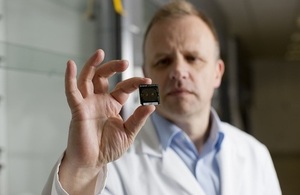Discuva: Leading the global search for new lifesaving antibiotics
A pharmaceutical company supported by Innovate UK is leading the world in the search for vital new antibiotics to treat resistant bacteria.

Discuva reseach new antibiotics
Cambridge-based Discuva was able to speed up its efforts to discover new antibiotics using its ground-breaking technology after winning £1.6 million from Innovate UK’s Biomedical Catalyst fund in 2012.
The business had already attracted some private investment for its promising work. The Biomedical Catalyst award helped it to attract a further £1.1 million in private investment to really get the business moving.
Discuva now believes its drugs could be in patients within two years. And the work has so impressed the major pharmaceutical company Roche that it has entered into a multi-million-dollar partnership with Discuva.
The collaboration includes an upfront payment of $16 million to Discuva and further payments of up to $175 million per product dependant on hitting particular development and sales milestones.
Discuva uses high-throughput microbial genetics, semi-conductor-based DNA sequencing technology and advanced computer search algorithms to identify the best chemical compounds to treat multi-drug-resistant bacteria.
Chief executive and founder David Williams said:
We are the most innovative antibiotics company in the world. We want to be the main company influencing the pushing through of new antibiotics. We will sign new collaborations and we will also take our own compounds through to market.
Discuva: Leading the global search for new lifesaving antibiotics
Drug-resistance could kill an extra 10 million a year
The Review on Microbial Resistance, commissioned by the UK government, estimates that drug-resistant infections could kill an extra 10 million people across the world every year by 2050. By this time they could also cost the world $100 trillion in lost output.
Even routine operations could become high risk if antibiotics are not able to treat potential infections.
David added
More than 90% of what we do in drug discovery does not work. The extra funding allowed us to do more science and more drug discovery. We were able to employ more people and more scientists.
Releasing us from the shackles of poor funding meant we could quickly finish the development of our technology and fully resource the research on a sensible number of potential drugs.
This approach led us to signing the largest preclinical antibiotic collaboration with a major pharmaceutical company and put us in a position as one of the world’s most innovative and productive antibiotic companies.
Biomedical Catalyst fills a funding gap
Discuva began in 2009 after David, who has a successful background in drug discovery, met co-founder Professor John Wain, a public health expert, at a barbecue. They challenged each other to do something about drug-resistant bacteria and the company was born.
By the end of 2011 they had raised some financial backing and were able to employ six people in the fledgling business and begin validating their technology and products. Today, the company employs 24 and has ambition to employ up to 250.
The research has also led to the formation of a spin-off company, Bactevo, which employs six on the discovery of beneficial bacteria and its potential applications. It believes Bactevo could also grow to a similar size and spin out further businesses.
David added:
The Biomedical Catalyst has filled a funding gap in early-stage UK research. It has not only supplied money, it has allowed companies to keep control of their technology and quickly move it in the right direction. It’s allowed them to innovate.
Find out more about Innovate UK funding awards and see our latest funding competitions